
The rain is pouring heavily and the walk just begun. My shoes are clods of mud. My rain jacket hangs over a chair in a hostel hundreds of miles distant. I am searching for Mister He, someone I read about on the blog of another wanderer. Mr. He is my only connection, or hope, for photographing the unique tea processing in this village.
It is November, and I am at 7,000 feet in Xishuangbanna China, the region of the world where the earliest tea was cultivated, and where the Da Ye (large leaves) used to make pu’er are plucked just as they were thousands of years ago.
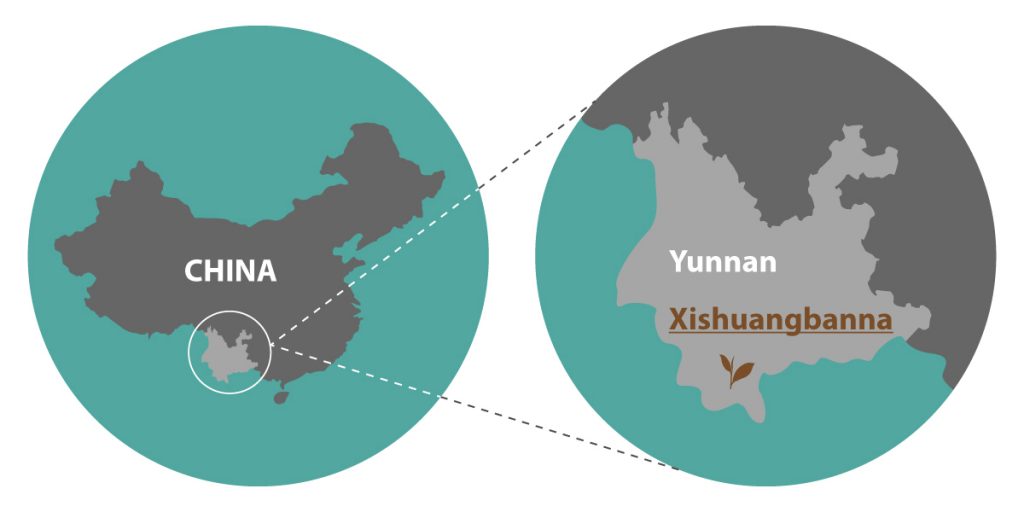
Postcard photos of landmarks and shrines have never motivated me to purchase a ticket for a distant land, but the image of a family squatting in a bamboo hut, roasting tea leaves over an open fire, led me to travel this road for the next five years. The cultures producing these teas are just as rich as the teas themselves. I have learned that understanding the people who make our teas enables us to appreciate them that much more. Tea is not merely a beverage in this part of the world; it is a way of life.
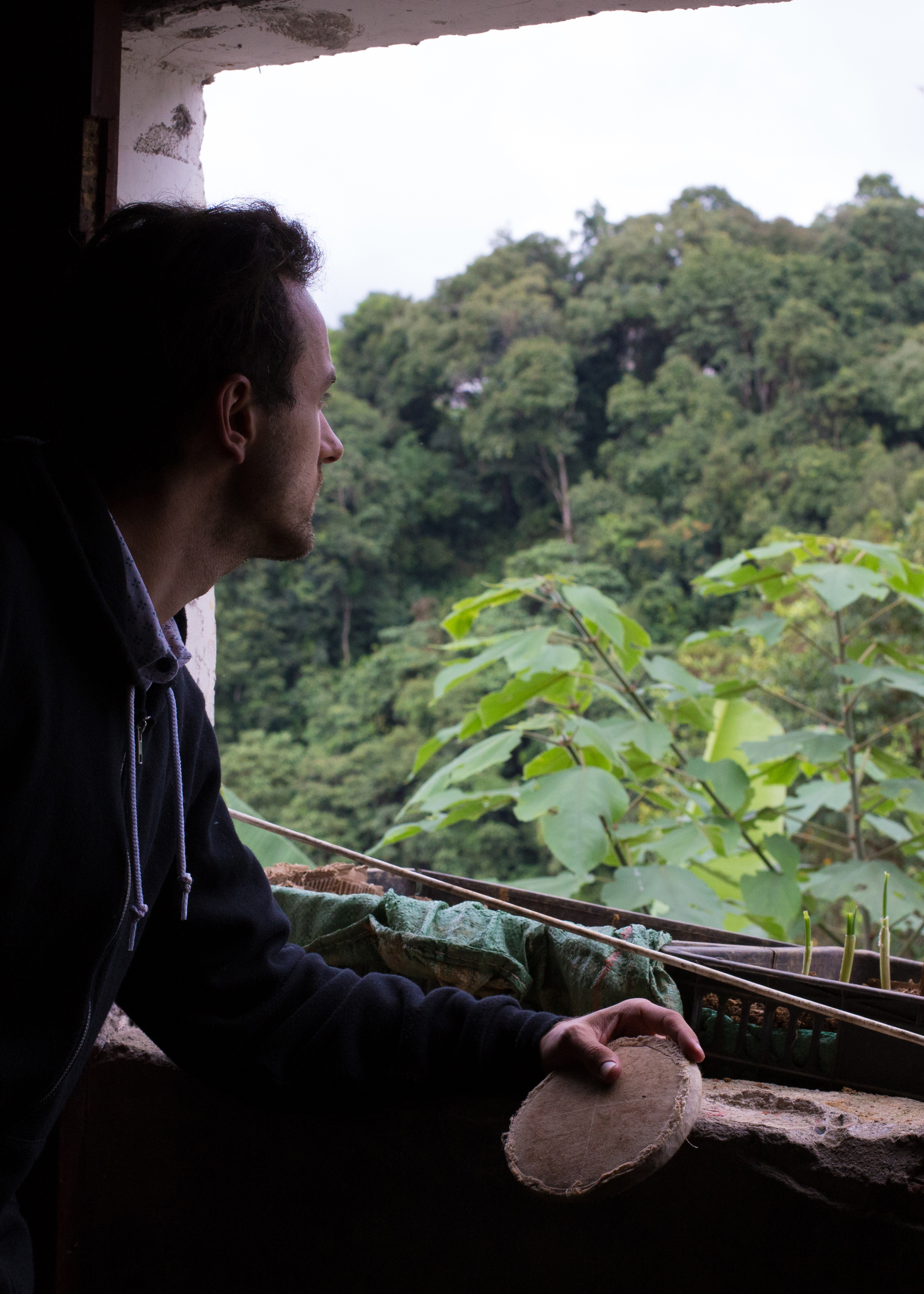
Mr. He lives a few miles from where the bus dropped us. My wife, Boualai, and I had traveled nearly five hours over difficult roads and nearly lost our lives when our bus crashed into a cement truck. When the bus finally stopped near the village, we had no idea where to go.
We started up a dirt path that has now been our only guide for the past hour.
“Mister He, cha,” I say gesturing to a villager walking past us. I pretend to take a sip from an imaginary teacup.
He squints, then shakes his head and keeps walking.
“Why do we have to see him? Can we just take photos of anyone making tea?” my wife asks as the climb gets steeper and the rain falls heavier.
I look at her and shake my head.
My wife comes from an even smaller village. Her people are as nomadic as these tea growers. In her village, outsiders are the ones who can ruin the insider, so they are always protective. In these ancient tea villages, the Chinese guard their tea and the processing secrets behind it, using any means necessary.
The rain is heavier now and puddles are everywhere. I know what my wife is thinking, so I won’t ask her if she needs to take a rest or look for a place to stay.
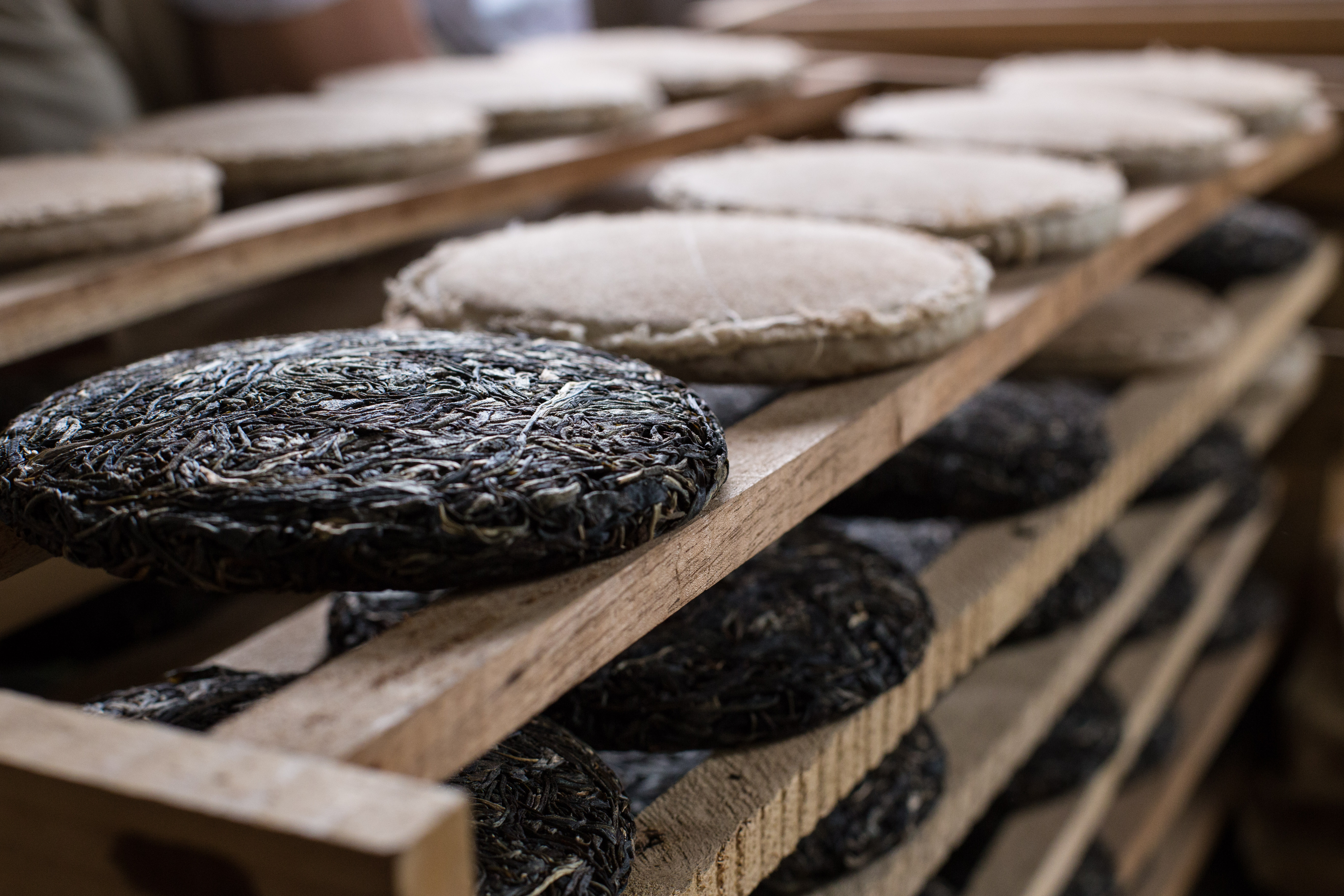
I see a young man wearing black sunglasses sitting in his garage. He nods as we come closer.
“Sorry, do you know Mr. He? Drink tea?” I ask him, pointing down the path.
He puts down a wineglass full of tea and jumps up. “Go.” He motions towards the top of the mountain. “He”.
“Straight, go straight?” I ask, pointing to the top of the mountain also.
“Okay,” he says, smiling and pointing again to the path.
I once walked 20 miles in India on a seemingly endless path that I thought was only three miles. Whenever I stopped villagers kept telling me I was very close. Just keep walking. So I did, for nearly two days.
We nodded, smiled and kept walking.
Ten minutes later we reach the end of the path. There were no signs and only two options: left or right.
A motorcycle pulled up.
In villages thousands of miles from the West and hundreds of miles from a town, local residents don’t often encounter people that look like me. The motorcyclist slows down to stare.
“Mr. He? Drink Tea?” I yelled over the high-pitched muffler.
He took off his helmet and pointed to a large house about 100 feet away.
“Mr. He? Cha?” I asked again, and motioned with my hand like I was drinking tea.
He quickly nodded then put his helmet back on.
By now we are drenched. We have walked hours since arriving at the village. Along the way, we were invited in by smiling villagers helping us get out of the rain. The tea was often so bad, we would smile and choose the pouring rain instead.
We are tired and uncertain of what to do.
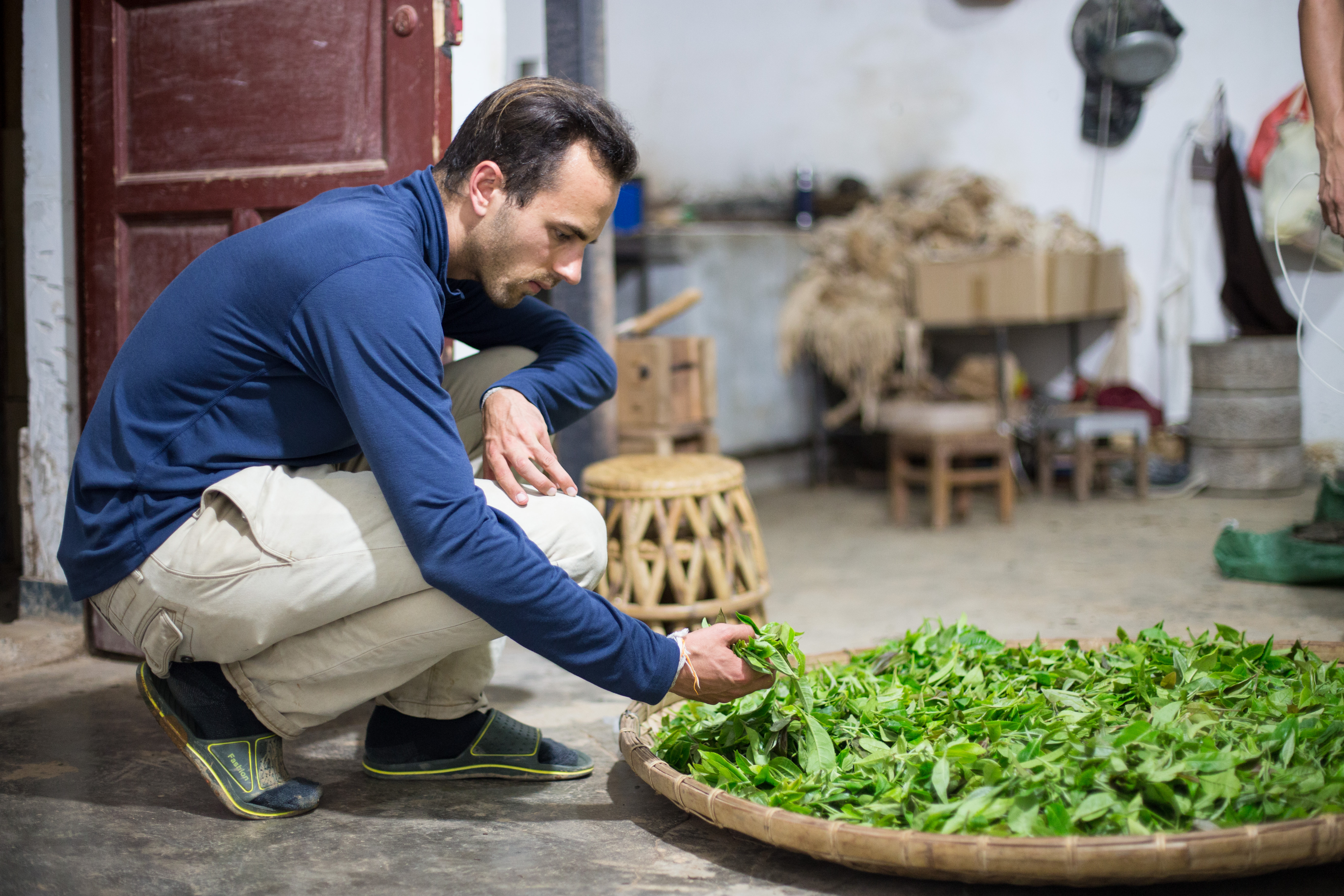
As we approach, we see that the house is more like a compound. There are tall white walls topped with barbed wire surrounding the home. The place looks as old as the giant tea trees that surround us. The rain finally lets up and we can see that there is a gate. It is open, inviting us to enter the front of the home.
Finally, we are within 50 feet of the entrance when we hear a vicious growl, then the barking of several dogs.
Dogs here are trained to protect homes, vehicles and even tea fields. In these parts, dogs are not pets, they are dogs.
My wife looked at me and motioned for us to turn back.
We can smell fresh tea being cooked over a wok. The sweet scent permeates the wet air inviting us closer. The view down the mountain is tropical and enchanting. The barking gets louder and the dogs know their role in this village.
I step forward to get a better look. The sound of heavy chains dragged across cement convinces me to jolt back to my wife.
I still have not seen the dog but the menacing bark convinces us to run full-speed back down the path.
Our pockets rattle with the sound of Chinese coins, prayer beads, and camera lenses as we shuffle our legs quickly down the dirt path filled with rocks and tree limbs.
“Hurry up!” I scream to my wife.
She is running but barely keeping up.
At the bottom of the hill we see slow down and don’t bother to turn back. Rain and sweat cover our faces, green trees and bamboo huts line the streets and the dogs are nowhere to be seen.
I look at her and shrug my shoulders. She wipes her face with the edge of her sleeve.
“Let’s head back into town. Forget Mr. He,” I say to my wife, wishing she had said it first.
Ahead of us, we see the young man who pointed us up to the top of the mountain. He is sitting in his garage. Two hours may have passed since we met. He waves us closer.
“Hello, tea,” he shouts, motioning us into his garage where a giant tree trunk serves as his tea table.
I turn to Boualai, shrug as all men do, and she kicks off her sandals and enters.
Liu, the young man, reaches into a giant bag of loose tea leaves. The bag is the size of a small car.
He motions with his hand, drink tea? We scoot up closer to the table.
He turns on the stereo and we hear Chinese instrumental music and we both catch our breath.
He pours a cup of tea and we sit back. Completely unexpectedly, this single cup turns into us sitting with him for twelve hours.
Liu’s family has been picking tea from their ancient tea trees for hundreds of years. Now it is his turn. He rented this small garage to get away from the factory while he designs his first wrapper, and prepares for his first production of his own Pu’er.
Timing is the heartbeat of our lives; it is the main element of fate and exercises far greater control over us than we know. How different a minute, a left turn instead of a right, a barking dog, can make.
Liu invites us to stay with him. He has a spare bed in his tea factory and will show us around the village in the morning.
Pu’er tea, especially Sheng (green) pu’er tea, is known and loved for the feeling it brings. There are many other aspects including its many health benefits. By now, we are feeling very, very, good. Our bodies are restored, our are spirits elevated, and our minds are more alert than ever. The tea is naturally sweet and tastes like apricots and guava. We later see these fruit trees are planted next to the tea trees.
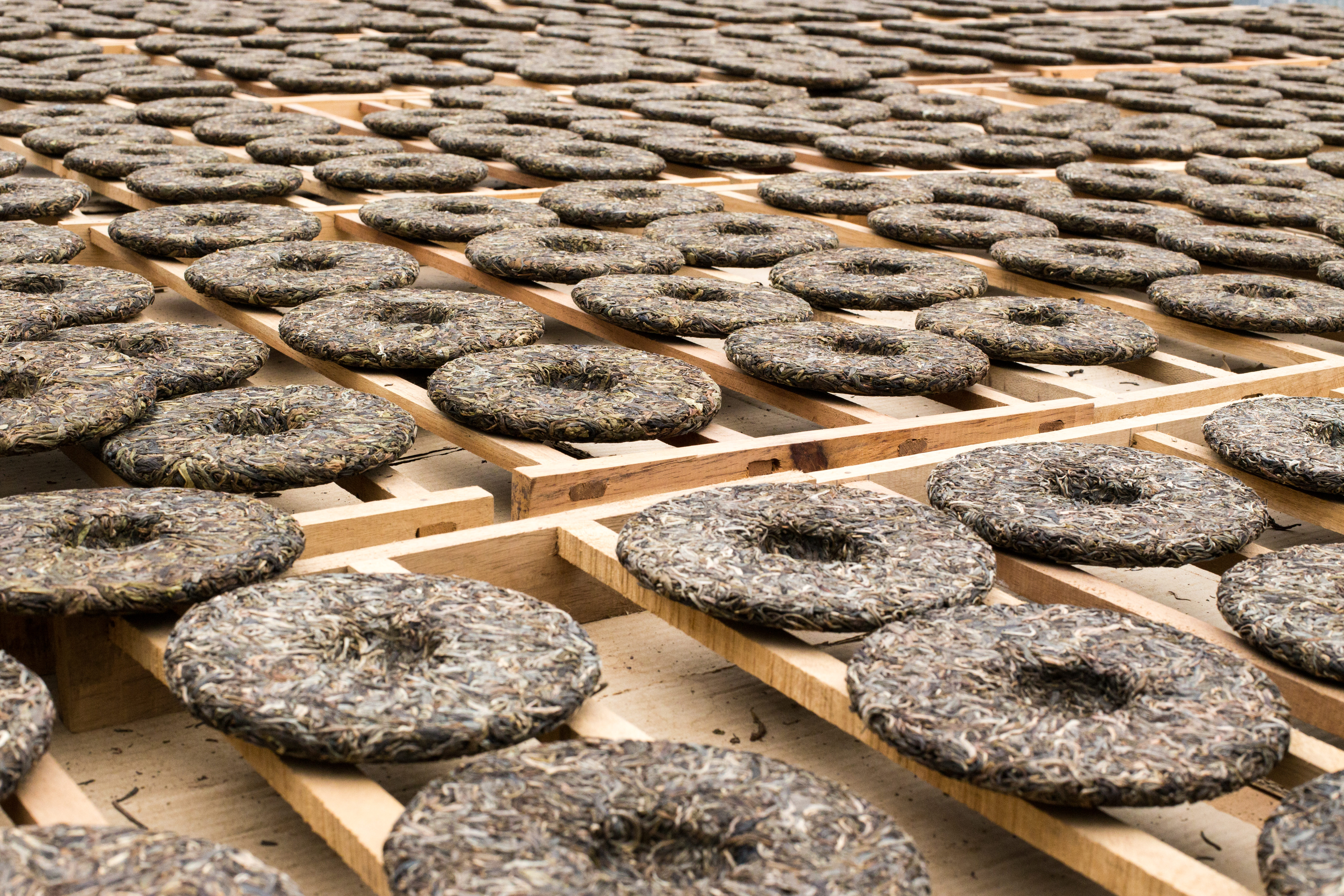
Being that I knew little of the mandarin language at the time, we use translation software on each of our phones and Liu walks us through the history of tea and the story of his family’s involvement in tea. The trees were planted 200 or more years ago. He explains why the finished leaves have jagged edges and why this particular leaf is bitter but the swallow is sweet.
Over the next few days, we photograph tea being picked and processed, and try our hand at it as well. Months later, realizing that this tea is special, I send samples to random tea businesses and wait in anticipation to see if they like it. I had no business in tea and surely never thought of selling it; I just wanted to see it being made.
The roads eventually dried and the monsoon season passed. In the weeks that follow, phone calls and emails confirm what I suspected: this tea is phenomenal.
This tea is a bridge between the many and the few; the cities of the world to the nooks of mountainsides. Tea is that great binder as strangers become friends or when family haven’t spoken in years. Through tea, I hope to take admirers one-by-one on that old bus and, when we arrive, I will point their way to the top of that mountain.